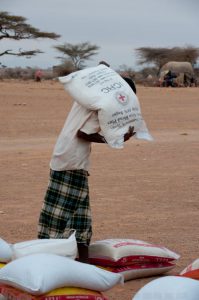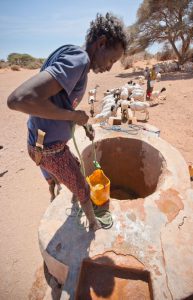The humanitarian situation in Somalia is on the verge of catastrophe, and concern is growing that the trajectory is worryingly similar to Somalia’s 2011 famine disaster, when an estimated 260,000 people died. Today an estimated 6.2 million, more than half the country’s population, face acute food shortage and the number of severely malnourished children is on the rise. This desperate situation comes against a backdrop of protracted conflict that has disrupted livelihoods and vital services such as health and water, sinking the country deeper into crisis.
The drought conditions exacerbated by failed rains has destroyed crops and wiped out livestock. Pastoralists are forced to walk increasingly long distances in search of pasture and water. The International Committee of the Red Cross (ICRC) jointly with the Somali Red Crescent Society (SRCS) and its vast network of volunteers continue to help drought-affected communities across Somalia in areas prone to conflict prone that are difficult to access.
Below is an overview of the emergency assistance given during the drought response.
Relief Activities
 These are implemented quickly and efficiently with a view to save lives during the drought and protect livelihoods at immediate risk. They include distributing food, cash and essential household items.
These are implemented quickly and efficiently with a view to save lives during the drought and protect livelihoods at immediate risk. They include distributing food, cash and essential household items.
- 243,582 persons received food rations of 50kg of rice, 25kg of beans and 10 litres of oil per household
- 427,860 persons received financial support in the form of cash
- 57,264 persons received essential household items (EHI) consisting of a kitchen set, three mosquito nets, two 10-litre jerrycans, a tarpaulin, two sleeping mats, a hygiene parcel for mother and baby, 6.25kgs of corn soya blend and two shawls
Health Care Activities
 The ICRC ensures people affected by drought and conflict have access to basic medical services that meet universally recognized standards. In Somalia, the ICRC supports four hospitals, two stabilization centres and 25 clinics in central and southern Somalia.
The ICRC ensures people affected by drought and conflict have access to basic medical services that meet universally recognized standards. In Somalia, the ICRC supports four hospitals, two stabilization centres and 25 clinics in central and southern Somalia.
- 241,789 patients received medical care at 25 SRCS clinics.
- 7,247 people were admitted in cholera treatment centres in Kismayo and Baidoa hospitals
- 31,802 malnourished children under age five were treated at stabilization centres and SRCS clinics. Of these, 4,413 were severe cases admitted in the ICU. 12,856 pregnant and lactating women received nutritional support
- 6 mobile health clinics equipped with drugs and personnel are offering medical services to villages in south and central Somalia.
Water and Sanitation Response
 The ICRC provides water in drought-hit areas and ensures access to clean and safe water for both humans and animals.
The ICRC provides water in drought-hit areas and ensures access to clean and safe water for both humans and animals.
- 163,750 persons benefitted from construction and rehabilitation of boreholes. Thirty 5,000-litre open-top storage tanks have been distributed to increase storage capacity for communities, along with 21 temporary troughs for animals to drink water
- 12,430 people benefitted the construction and deepening of wells
- 518,429 persons benefited from access to safe and clean water through hygiene promotion activities, household water treatment and chlorination of water supplies



